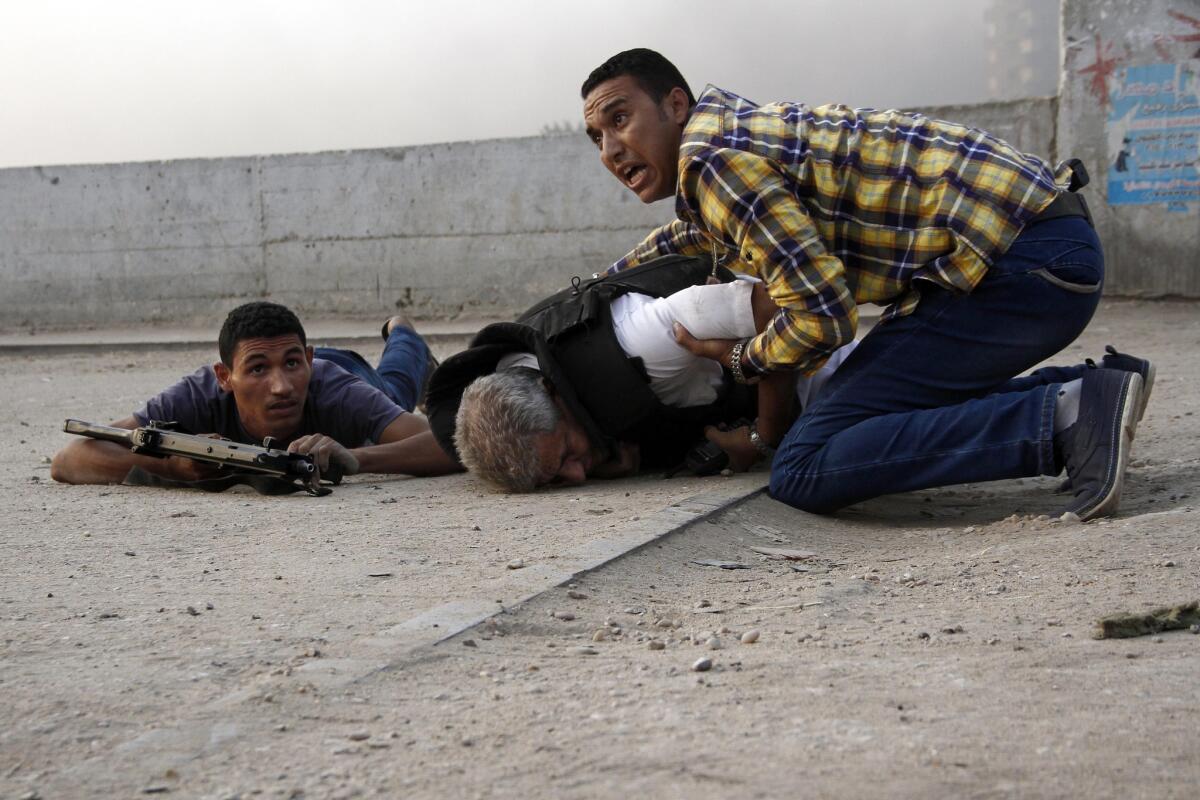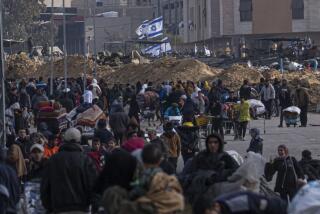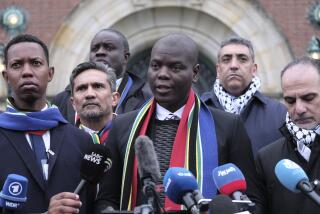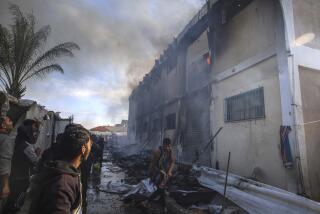Egypt court upholds mass death sentence for 183, drawing criticism

- Share via
Reporting from CAIRO — Reaffirming a judicial practice that has come under strong international criticism, an Egyptian criminal court Monday backed a mass death sentence previously handed down to 183 people accused in a deadly attack on a police post.
Mass tribunals and sentencings have become a periodic feature of Egyptian court proceedings in the 19 months since the popularly supported coup that Egypt’s current president, Abdel Fattah Sisi, led against Mohamed Morsi, his Islamist predecessor, who was backed by the Muslim Brotherhood.
Under Sisi, a former commander in chief of the armed forces, harsh punishments at times based on scant or no evidence have become the norm in cases involving the deaths of soldiers or police. That overall inclination on the part of the courts often intensifies after a major strike by Islamist militants, such as attacks in the Sinai Peninsula last week that killed more than 30 people, most members of the security forces.
The crackdown on Islamists, more sweeping than any carried out by previous governments, shows no sign of abating — with indications that it may grow even harsher. Sisi said after the Sinai attacks that Egypt was “paying the price” for confronting Islamists, and he branded Morsi’s Muslim Brotherhood as an integral part of the international threat posed by groups such as Al Qaeda and Islamic State.
In the latest case, the court upheld the death penalty against nearly all defendants sentenced in the killings of at least 11 police officers during an August 2013 rampage in Kerdasa, a town outside Cairo in the shadow of the pyramids that has been a Muslim Brotherhood stronghold.
The attack came amid a wave of unrest that broke out after security forces’ violent breakup of a sit-in by Morsi followers at Cairo’s Rabaa al Adawiya square and other locales. More than 800 people died in the dispersals, according to human rights groups.
The attack on the police station in Kerdasa, in which the corpses of slain policemen were reported to have been mutilated, was one of the deadliest episodes in response to the killings at Rabaa.
Lawyers said that many of the defendants rounded up after the police station attack were not even present at the scene, and that some of those arrested were Coptic Christians, not Islamist followers of Morsi. Other defendants included boys and elderly men, they said.
In the initial trial, provisional death sentences were handed down in December to 188 defendants. In the latest ruling, that total was reduced to 183 because two of the defendants had died, two others were acquitted and a fifth, a minor, received a 10-year jail sentence, according to a report by the state newspaper Al Ahram. Thirty-seven of the defendants were tried in absentia, it said.
Last year saw other high-profile cases involving mass capital sentencings, which were widely condemned by Western governments and human rights groups. In March and April, a judge in Minya, south of Cairo, imposed a total of more than 1,200 death sentences, 220 of which were ordered upheld. None of the sentences has yet been carried out.
Sisi has insisted repeatedly that the judiciary is independent and the executive branch cannot interfere in court matters. Western governments, including the Obama administration, have condemned the sentencing with little visible effect.
The latest ruling brought new demands for Egypt to bring its courts into line with international standards.
“To impose death [sentences] when there are serious doubts hanging over the fairness of the trial is outrageous and flouts international law,” said Hassiba Hadj Sahraoui, deputy director for the Middle East and North Africa program at London-based Amnesty International.
Defense lawyers said the mass tribunals made it impossible for the accused to receive a fair hearing, with individuals given no opportunity to hear evidence against them or offer any defense.
The judge in the latest case, Nagy Shehata, has been involved in several other closely watched courtroom dramas, including last year’s sentencing of three journalists for the news channel Al Jazeera English to between seven and 10 years in prison. A retrial was ordered, and one of the three journalists, Australian correspondent Peter Greste, was freed and deported Sunday.
Most arrests and killings of protesters have involved Morsi supporters, although secular critics of the government have been caught up as well. Human Rights Watch estimated that about three-quarters of the approximately 40,000 people arrested since the coup were suspected Islamists.
The Muslim Brotherhood, formerly Egypt’s largest opposition movement, has been declared a terrorist organization, and Sisi claims it is responsible for nearly all attacks against state and security targets that have taken place since the ouster of Morsi, Egypt’s first democratically elected president.
Sisi blamed the Brotherhood for last week’s Sinai attacks, though another group that describes itself as the Egyptian franchise of Islamic State claimed responsibility.
That group, previously known as Ansar Bayt al Maqdis, or Partisans of Jerusalem, now calls itself Sinai Province. It has demonstrated continuing ability to carry out complex attacks, despite army tactics including the razing of much of the town of Rafah, on the border with the Gaza Strip.
The courts and security forces have been a crucial element of Egypt’s self-declared war on terrorism. On Monday, a former lawmaker, Mamdouh Ismail, was sentenced in absentia to life in prison on charges of taking part in violence in after Morsi’s ouster. And on Sunday, an Egyptian policeman was arrested, accused of fatally shooting an Islamist suspect who was hospitalized at the time.
Twitter: @laurakingLAT
More to Read
Sign up for Essential California
The most important California stories and recommendations in your inbox every morning.
You may occasionally receive promotional content from the Los Angeles Times.










